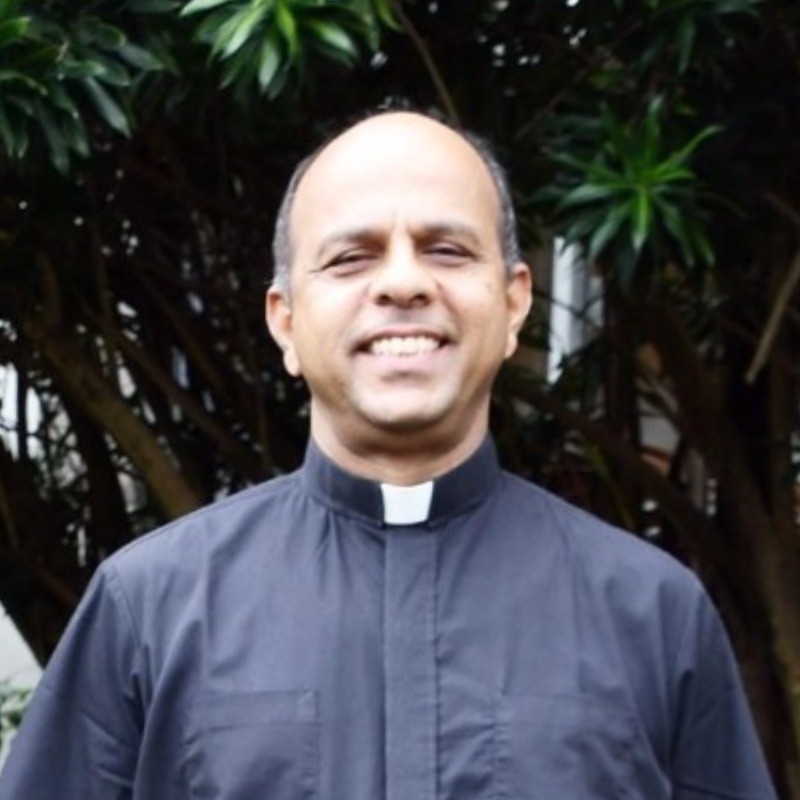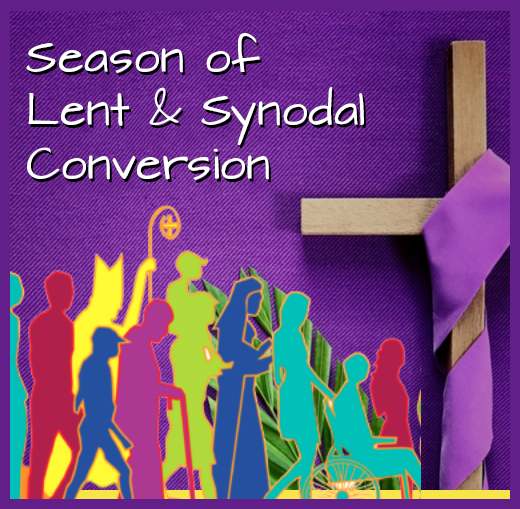By Fr George Plathottam SDB Executive Secretary (FABC-OSC)
The season of Lent beckons us to metanoia, a conversion of heart. Lent is not merely a time to do some penance or give up some of the other habitual pleasures we enjoy. It is a privileged period of time in which the Church calls us to undertake an inward journey, a closer look into ourselves. It is a time when the Lord calls us to examine our relationship with God, with one another, the values and attitudes that determine our actions. It is a time for more intense prayer, fasting and almsgiving.
Lent: a Journey with God and One Another
Lent calls us to be renewed in spirit. Lent is observed at two levels- at the individual and communitarian levels. Besides the individual conversion or metanoia, we also mark this period as a time of renewal for the whole Church, that is the community of the baptised, members of the mystical body of Christ.
The Church observes Lent as a journey towards God. The Synod on Synodality, which the Church is currently celebrating as a worldwide movement, aims at renewal of the whole Church through fostering a greater sense of communion, more intense commitment to mission, and the participation of all. The word ‘synod’ in the tradition of the Church indicates journeying together. It is a journey in faith, a pilgrimage together with all the people of God. The aim of the Synod is to proclaim Christ and to bear witness to his saving message.
Synodal Conversion
The whole Church is in the process of renewal and recommitment to its mission through a synodal conversion. As Pope Francis has envisioned, it is the return of the Church to a missionary activity rooted in the community – to proclaim the Gospel everywhere. It consists in changing the way of thinking about the Church and changing the way of being Church. He desires a Church that is not inward looking, self-referential, but a Church that is inclusive, all-embarking and reaches out to everyone, a that reached out to the periphery, a Church that is less clerical and less hierarchical. The Synod reiterates that what constitutes the identity of all Christ’s disciples is their baptism, not clerical status or hierarchical positions. The synodal conversion entails rediscovering this identity, becoming like Christ who emptied himself (kenosis), listening to the Holy Spirit and to one another, and to discern what the Spirit is saying to the Church today.
According to the Venezuelan theologian Rafael Luciani, “Synodality is an invitation to foster processes of conversion as we listen to one another and larger society while reading the signs of the times together.”
A synodal perspective challenges the culture of clericalism and proposes a culture of dialogue and consensus. The word ‘conversion’ appears ten times in the Synod handbook, Vademecum. Its frequency is a critical clue to a primary fruit which Pope Francis hopes the People of God will experience while on the synodal journey. Pope Francis called for a synodal Church, a Church in which the voices of all are heard and respected. Above all, this process is about being open to the voice of the Holy Spirit as we journey together.
The Preparatory Document for a synodal Church describes the process of synodality as being on a journey. “To journey together we need to let ourselves be educated by the Spirit to a truly synodal mentality, entering with courage and freedom of heart into a conversion process.” The experience of synodal conversion is rooted in a genuine attitude of listening, with the conviction that in the ‘kairos’, that is, God’s own time, we will all be united with him.
Vatican II and the Call for Reform and Renewal
The Synod is calling for an ecclesial renewal through a deep and serious process of conversion, marked by pastoral and institutional restructuring. This call can be traced back to the renewing force that the Second Vatican Council gave. The conciliar decree Unitatis Redintegratio, (1964), called for permanent reform of the Church: “The pilgrim Church in this world is called by Christ to a permanent reform.” This reform involves all ecclesial institutions and structures and is carried out from the new ecclesiology proposed by the Council.
The bishops, priests and clergy are not an elite group separated from the holy people of God but rather a part of it. The Church draws its life from Christ through the breaking of bread, listening to the word of God and living a life of communion in Christ. The Church, as Pope Francis insists, is a Church which is inclusive, open, welcoming. It is a Church without exclusion.
The Church and the disciples of Jesus Christ must follow in his footsteps and adopt his attitudes (cf. Mt 9, 35-36). The Vatican II affirmed that every baptised person is a missionary disciple by virtue of his or her baptism.
Ecumenical Councils and Synods in the past too have been journeys of conversion for both participants and the whole Church. Renewal has been a powerful motive of every Ecumenical Council in the history of the Church. When Pope John XXIII convoked the Second Vatican Council, he urged the Church to open its windows to “let in fresh air” by using a methodology of aggiornamento (bringing up to date) and ressourcement (returning to the roots).
The word aggiornamento caught the attention of the world, Catholic and others, because it implied a rejection of the view that human nature is always the same. It opened the idea that individually people are responsible for their lives, and collectively they are responsible for the whole world. The word collegiality and Synod of Bishops as a permanent institution in the Church, emerged from the Vatican II. It offered to the bishops and local churches a new sense of collective responsibility for the whole Church and the world.
Church life is circular, not hierarchical
In continuation of the spirit of Vatican II, Pope Francis set in motion an entirely new project of conversion for the Catholic Church: Synodality. This was conceived as an expansion of the work of collegiality. The entire faithful, not only the hierarchical Church or the bishops, were to take up their baptismal responsibilities and collaborate in mission, participate fully in all aspects of ecclesial life, and discern together in decision-making. The bishops, therefore, became a “point of convergence of this listening process conducted at every level of the Church’s life.”
Pope Francis said that an unprecedented experience is underway in the Church with a synodal model and with a genuinely ecclesial approach following the path of the Gospel. It is apt to imagine the Synod on Synodality as an enormous project of conversion- a project that involves the entire Church being led by the Holy Spirit making the Church new.
In this vision, the Church life is circular, not hierarchical. Individuals are attentive and responsible. They exercise their faith authentically, together in community and together with their priests and bishops. The laity too go out into the world to bring “the light of Christ to all people” (Lumen Gentium n.1). Therefore, the laity too must be empowered to be missionaries. Any renewal process today must be concerned with converting clericalism to synodality. Renewal should be synodal rather than hierarchical.
Fruits of Synodality
The fruits of synodality is expected to have lasting consequences on the Church. Synod is not just assemblies and meetings, nor are they intended merely to produce a series of documents, or evolve strategic plans. At the opening of the Synod, Pope Francis said:
We recall that the purpose of the Synod is not to produce documents, but to plant dreams, draw forth prophecies and visions, allow hope to flourish, inspire trust, bind up wounds, weave together relationships, awaken a dawn of hope, learn from one another and create a bright resourcefulness that will enlighten minds, warm hearts, give strength to our hands.
The fruit of the Synod of Bishops becomes most evidently manifest in a dynamism of communion which inspires all ecclesial decisions. This renewal should spread beyond the official processes of the Synod. Transformation is the work of the Holy Spirit. If the Synod is indeed collaborating with the Spirit, then the fruits of the Spirit (Galatians 5:22-23) will be evident. Pope Francis invited every Catholic in every local Church to actively participate in the Synod. There have been moving testimonies of people who participated in the Synod assemblies who have been touched by the transforming power of the Spirit. These movements of our hearts, minds and spirits are movements of conversion. The Holy Spirit breathes in us to renew us and help us enlarge the space of our ‘tent’.
As the Holy Spirit is the protagonist of the Synod, we can be certain that there is no going back or going astray from the path of synodal pilgrimage. Like Jesus, we are moved to take along others, reach out to them, and strive for healing, reconciliation and peace. In this journey towards God, we learn to walk with everyone in a spirit of communion, mission and participation.
Furthermore, the preparatory document states: “It is precisely this path of synodality which God expects of the Church in the third millennium.” As Christians we are baptised into the life and death of Jesus, and it is from this we all receive our missionary mandate. Synodality is at the service of the Church’s mission, in which all members are called to participate by virtue of our common baptism. A synodal Church is a Church going forth, a missionary Church whose doors are open to all.
A conversion that is personal and pastoral
“As Peter was changed by his experience with Cornelius, so too we must allow ourselves to be transformed by what God is inviting us to do. Through the synodal process, God leads us on the common path of conversion by what we experience with one another. God reaches us through others, and he reaches others through us, often in surprising ways” (Vademecum 4.1).
The call of the Synod process is a moment given by God to his people to repent and convert. The call to conversion is both personal and pastoral. At the personal level conversion implies avoiding prejudices, stereotypes, exclusion and ignoring the poor. It calls us to be rid of the virus of self-sufficiency. At the pastoral level, conversion implies humility to listen to everyone and courage to speak without fear, finding new and creative ways to respond to the signs of the times.
As the synodal journey blends with the Lenten Season, let us respond to the Lord’s call to repent, to return to him, to seek metanoia and renewal. On this journey we are accompanied and assisted by Mary, the Queen of the Apostles, the communion of saints. We seek the ever abiding presence of the Holy Spirit, the strength and grace that come from the Sacraments and the word of God, so that we do not falter, but are guided and assisted as we journey towards the Paschal Feast.

Fr George Plathottam PhD is Executive Secretary, FABC Office of Social Communication, and a Consultant to the Dicastery for Communication of the Holy See. He is actively engaged in promoting Synod on Synodality.






